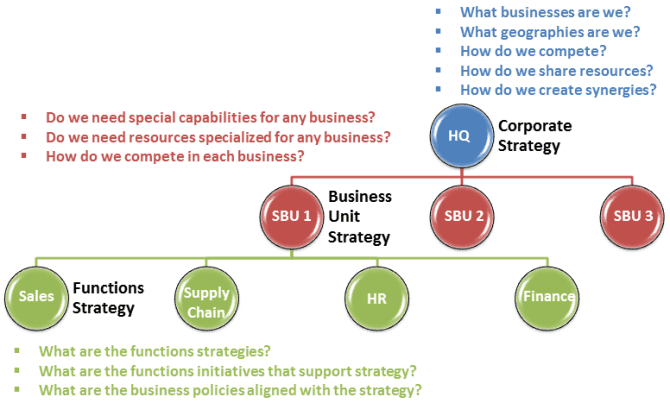- January 20, 2013
- Posted by: Javier González Montané
- Category: Strategy
No Comments

It is well accepted that there are three strategic levels: corporate, strategic business and functions.
The Three Strategic Level: Adapted from Javier Gimbert and Luis Vives

Common mistakes defining strategies
- Corporate Strategy: There are some firms that create the corporate strategy but they do not drill down to the other strategic levels. If we do not cover the three levels, most likely execution will fail. We can find companies with a well-defined corporate strategy, but they have a poor or even an un-existing functional strategy. Other important mistake is that companies feel that strategy is being to be “easily” copied, and they communicate it only a few company top positions. Obviously, if the strategy is not well communicated to the whole company execution is going to fail.
- Business Unit Strategy: Many companies used to ask themselves the “wrong” question. So they ask “Do our businesses have different customers?” in order to create business units. But probably the right question should be: “Do we need special capabilities/resources for any business?” While the first question quite often pushes firms to create SBUs (Strategic Business Units), the second likely shows that we would need less SBUs. From global headquarters point of view likely make sense create a few SBUs in order to reduce management complexity. However, at local level quite often subsidiaries assume that they must be aligned at corporate level replicating the corporate structure regarding SBUs. That replication many times mean massive investments in overheads with unclear ROI.
- Functions Strategy: We can find Functional Directors very much focus on day by day or monthly tasks without a clearly formal and structured department/function strategy. Thus, we have Sales & Marketing Departments what only strategy is reactively waiting for customer calls rather than defining formally strategies for customers’ acquisition, retention, and so on. We have Financial Departments what main focus just on legal accounting formalities or monthly financial report packages rather than defining formally strategies to improve days of sales outstanding, local taxes payments improvements, and so on. Moreover, we have Supply Chain Departments focus on stocking or managing urgent shipments rather than creating formal strategies for stock reduction, lean supply chain, and so on.

